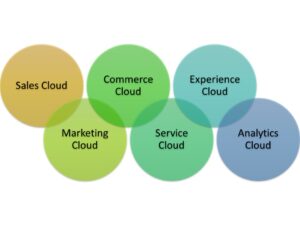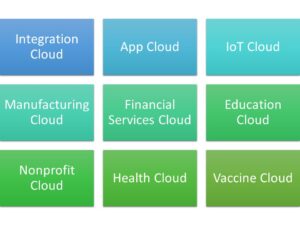The 15 Types of Clouds in Salesforce and Their Features
Don’t you know that there are 15 different types of clouds in Salesforce? Salesforce is more than just a single CRM tool; it’s a collection of tools and services designed to serve different functions.
So what do all these Salesforce clouds do? In this article, you’ll discover Salesforce’s six major clouds, as well as another nine more targeted clouds, and learn about their essential features and functions.
6 Major Types of Clouds in Salesforce
People who don’t know a lot about Salesforce might be excused for thinking that the company offered a single product for customer relationship management (CRM). In reality, Salesforce offers a variety of services and tools, each targeted at a specific function or market. These tools are called “clouds,” because they’re all served via cloud computing.
There are six major Salesforce clouds used by most companies, as well as a variety of more targeted clouds. The six major clouds are:
(1) Salesforce Sales Cloud
Salesforce Sales Cloud is perhaps the company’s most popular cloud. It automates the sales process, drives lead generation, and facilitates communication across multiple channels. Sales Cloud is used by sales reps and sales managers in both B2B and B2C segments.
One of the primary reasons businesses employ Sales Cloud is to increase sales – and it works. According to Salesforce, companies using Sales Cloud register a 37% increase in win rate and a 44% increase in productivity. Other research indicates that using Sales Cloud can increase conversion rates by anywhere from 40% to 300%.
Sales Cloud offers several important features for businesses of all types, including:
- Account data and contact management
- Lead management and tracking
- Opportunity and product management
- Campaigns
You can add some modules to enhance Sales Cloud’s functionality. Some of the more popular modules include:
- Customer 360 Data Manager – connects customer experiences across multiple departments and channels
- Sales Path – helps qualify leads more quickly
- Einstein AI – provides lead scoring and predictive analysis for smarter decision making
(The following video explains Salesforce Sales Cloud in more detail.)
Salesforce Marketing Cloud
Salesforce Marketing Cloud, formerly known as Exact Target, works to automate your company’s marketing activities. Marketing Cloud helps you to engage in real time with customers across a variety of channels, including email and social media. It also helps track individual customers throughout the multiple touchpoints of their journey. It lets you create personalized one-on-one communications that can lead to increased sales.
Marketing Cloud features several useful marketing tools, including:
- Email Studio – creates personalized, targeted emails
- Data Studio – to help you monetize your customer data
- Social Studio – to connect social data with your marketing activities
- Advertising Studio – to engage with customers via social media, customer service, and other channels
- Mobile Studio – to manage push notifications via SMS messages
- Interaction Studio – to connect online and offline touchpoints
(3) Salesforce Commerce Cloud
Salesforce Commerce Cloud is a platform for managing ecommerce activities. It’s designed specifically for B2C companies that offer their services online.
Some of the most important features of Commerce Cloud include:
- Channel management across offline, digital, mobile, and social channels
- Roadmaps for planning customer journeys
- Cloud scalability
- LiveMessage to automate many important customer functions
(4) Salesforce Service Cloud
Salesforce Service Cloud is a cloud-based platform for customer service management. It functions as a help desk and customer service platform and enables companies to provide personalized customer support.
Service Cloud does all of the following:
- Uses AI and natural language processing to suggest replies for agents in real time
- Offers a multifunctional dashboard to provide a real-time record of customer interactions
- Provide robust reporting for a 360-degree view of your support operation
- Integrates telephony into your support system with Service Cloud Voice
(5) Salesforce Experience Cloud
Formerly known as Community Cloud, Salesforce Experience Cloud connects customers, employers, partners, and agents into online communities. It helps you create web-based portals for collaboration, customer services, sales, and other key activities.
Experience Cloud taps into your CRM data to create an internal social platform for all Salesforce users in your organization. You can create custom portals for your HR department, your IT help desk, and other internal services. Experience Cloud also functions as a help forum and support site to connect with the teams they need.
(6) Salesforce Analytics Cloud
Salesforce Analytics Cloud is designed to help your organization get the most value from the data you collect. Analytics Cloud uses AI technology to dig deep into your data and extract actionable insights. It lets you intuitively visualize your data in useful graphs and charts to share with key stakeholders. The goal is to provide more useful information to help your team make better and more informed decisions.
Other Types of Salesforce Clouds
Salesforce offers nine more clouds for specific applications and industries. These clouds are designed to empower different types of businesses and organizations.
These additional clouds include:
- Salesforce Integration Cloud, which provides a single view of customer data across large enterprises
- Salesforce App Cloud, for managing apps, users, and events
- Salesforce IoT Cloud, for transforming raw data harvested from connected smart devices into useful customer data
- Salesforce Manufacturing Cloud, which provides a CRM solution for manufacturing companies
- Salesforce Financial Services Cloud, which provides asset management and wealth management functionality for financial advisers
- Salesforce Education Cloud, to manage recruitment, admissions, institution operations, and the student experience for educational institutions
- Salesforce Nonprofit Cloud, for managing donors, fundraising, and other operations for nonprofit organizations
- Salesforce Health Cloud, which unifies patient, medical, and benefits data for healthcare organizations
- Salesforce Vaccine Cloud, a new cloud for managing COVID vaccine administration, vaccine status, and test results
These clouds can be used by themselves or with other Salesforce tools and clouds.
Let Rainmaker Help You Manage Your Salesforce Clouds
Implementing and managing all these Salesforce clouds can be a daunting experience. Let the Salesforce experts at Rainmaker help you choose and manage the clouds you need in your business. We have years of experience in all types of Salesforce installations, so we know what’s right for you and how to make it work for you. Our Salesforce Managed Services will help you get the most value out of your Salesforce clouds and grow your business.
Contact Rainmaker today to learn more about Salesforce clouds!









